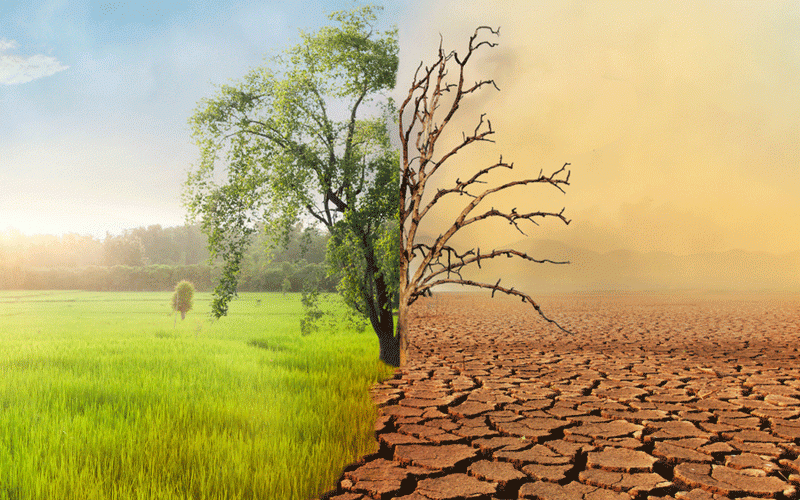
Climate change expresses a psychosocial defence mechanism that prompts us to recoil when we consider the implications of climate science.
When viewed honestly through the lens of traumatology, this deepening existential crisis presents an entirely new, unprecedented, and higher-order category of trauma: climate trauma.
What is unique about this category of trauma is that it is an ever-present, ever-growing threat to the biosphere, one that calls into question our shared identity: What does it mean to be “human” in the Anthropocene?
Because it is superordinate, climate trauma is continually triggering all past traumas—personal, cultural, and intergenerational—and will continue to do so until such time as it is acknowledged.
Climate trauma provides the missing narrative explaining our dissociated unresponsiveness to the climate crisis, and suggests an alternative approach to effecting the kind of fundamental societal change needed to remedy our collective dissociation.
The first steps toward effecting this kind of ambitious sociocultural change are naming the disorder and reforming the taxonomy of psychological trauma.
As human beings, our physical and mental health cannot be separated from the environments in which we live.
Climate change, if left unaddressed, is projected to have catastrophic consequences on the mental health of entire populations.
- Secure your business premises: Police
- New law answers exhumations and reburials question in Zim
- DT Bio Mudimba: A sungura perfectionist
- Travelling & touring: Gandavaroyi Falls: Tourism’s hanging fruit
Keep Reading
Mental health wellness, thriving gender relations, fluid networks from which to batter and trade as well as sustainable interactions between humans and the natural ecosystems should save the day,especially if water is available.
The family becomes a huge resource to sustain livelihoods in a village or community set up where strong family bonds sustain the village or community ecosystem aided by traditions that have seen better days including strong environmentally cognisant of spiritual practices followed by indigenous people of the past.
Organised human societies have the ability to completely change the world.
While we have excelled at building, destroying and rebuilding, we have not succeeded at conserving, preserving, and sustaining.
Nature commoditisation and its impact on environment and society suggests that our propensity toward environmental destruction — a tragic flaw of the modern economy — can be understood as a result of hidden economic forces that seek to mask the unmet needs of the inner child of most people.
These forces drive social and economic development towards increasing mobilisation of energy and material beyond what is actually needed to achieve general prosperity and meet basic human needs.
Armaments, universal debt, and planned obsolescence—those are the three pillars of western prosperity.
If war, waste, and moneylenders were abolished, this world would collapse.
And while people are overconsuming the rest of the world sinks more and more deeply into chronic disaster.
We've become a society of notoriously unhappy people: lonely, anxious, depressed, destructive, dependent — people who are glad when we have killed the time we are trying so hard to save.
Needing to have reality confirmed and experience enhanced by photographs is an aesthetic consumerism to which everyone is now addicted.
Industrial societies turn their citizens into image-junkies; it is the most irresistible form of mental pollution.
Societies are full of consumers, by-products of a lifestyle obsession.
Climate change, crime, poverty etc don't matter, what matters are celebrity and social media statuses, television with 500 channels, some guy's name on underwear.
The folly of endless consumerism is sending us on a wild goose-chase for happiness through materialism (the burning of bridges we need to cross).
The national newspaper "The Herald" had a report on the dire future of the people of Binga, Matebeleland North, in Zimbabwe (accessed January 17, 2024).
Their reliance on rain-fed underground water is under threat from climate change with the report citing experts "anticipating drought recurrence in Binga" ,.....
And the drought recurrence "to reach 30% increase by 2030 due to climate change, some boreholes and small water bodies are drying up leaving communities in despair".
The report informs the reader through villager account that "they have witnessed their once wildlife-infested and heavily Mopane-wooded land turn dry, with declining harvests being recorded over the years."
On the surface, one cannot discern the implication of such a concern other that related to loss of life or see the end in sight of once vibrant communities who might save face by migration perhaps or revive some forgotten traditions.
Nature and humans lived in harmony including wildlife and humans giving each other space to live with respect for each other.
For humans, this connection with nature has always been reciprocated by wildlife retreating to foliage away from crops save for a few errand occasions where the ground participation rules were broken and unfortunately those rules which used to maintain harmony are being trampled left, right and centre due to profit oriented development which has overtaken the most needed life oriented development..
The vital life force that is suppressed and unused doesn’t disappear. It is converted into dark energy and redirected elsewhere.
In our world, much of this buried potential is diverted toward mass consumerism and the conspicuous acquisition of material goods that has contributed immensely to environmental abuse paving way to climate change.
The lords of retail are masters of propaganda, indoctrinating a culture in powerful beliefs (“I am not enough”) and filling people with perpetual desire (“To be worthy, I must acquire x, y, or z”).
The outcome of this approach is mass accumulation, exponential waste, skyrocketing debt, and a pervasive feeling of scarcity.
The impacts of climate change cannot be overemphasized as we see more and more news about extreme weather events, droughts, water scarcity, wildfires, and flooding and their impacts on agriculture and human systems.
The impact of these events on health and mental health is becoming clear.
The air pollution and higher temperatures that come with rising greenhouse gases significantly increase the risk of neurological and psychiatric problems like strokes and dementia.
Changes in the supply and nutritional content of food contribute to psychiatric illness, and changes in infectious disease patterns are exposing more people to the neuropsychiatric consequences of encephalitis.
The effects of climate change extend to an individual’s overall well-being, a finding that psychologists continue to elevate. Here are a few recent research findings examining the effects of climate change on mental health:
- Gender-based violence: In 2022, researchers at the University of Cambridge analyzed 41 studies that explored several types of extreme weather events, such as storms, floods, droughts, heatwaves, and wildfires. They found that gender-based violence appears to be exacerbated by extreme weather and climate events. Contributing factors include economic shock, social instability, enabling environments, and stress.
- Posttraumatic stress disorder (PTSD): Survivors of the 2018 Camp Fire, one of the deadliest and most destructive wildfires in California history, had rates of PTSD on par with war veterans, and they were at increased risk for depression and anxiety, according to a 2021 study from the University of California–San Diego. Survivors of hurricanes and floods suffer similar rates of depression and PTSD.
- Suicide: The economic impacts of droughts lead to increases in suicide, particularly among farmers. Further, authors of a 2018 study in the journal Nature predicted warmer temperatures could lead to as many as 40,000 additional suicides in the United States and Mexico by 2050.
- Aggression: Higher temperatures lead to more aggressive behaviors. A 2021 study published in the Journal of Public Economics found that violent crime in Los Angeles increased by 5.7% on days when temperatures rose above 85°F compared with cooler days.
- Anxiety: Even some Americans who have not been directly affected by a climate disaster are experiencing climate anxiety—an overwhelming sense of fear, sadness, and dread in the face of a warming planet or anxiety and worry about climate change and its effects. A 2020 APA survey found that 56% of U.S. adults said climate change is the most important issue facing the world today. Nearly half of young adults ages 18 to 34 said they felt stress over climate change in their daily lives.
- Tinashe Chikodzi is a social en-trepreneur, founder and director of Chartered Institute of Organic Health (CIOOH) Trust, chartered customer service professional (CCSP), member of the Africa Project Against Suicides. Feedback: Mobile No. +263 716 641 253
- These weekly articles are coordinated by Lovemore Kadenge, an independent consultant, managing consultant of Zawale Consultants (Private) Limited, past president of the Zimbabwe Economics Society and past president of the Chartered Governance and Accountancy Institute in Zimbabwe.
- Feedback: Mobile No. +263 772 382 852











